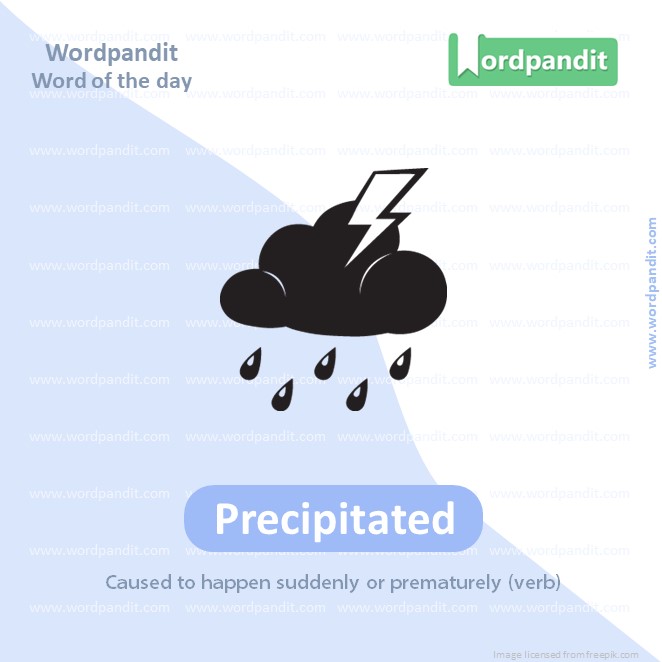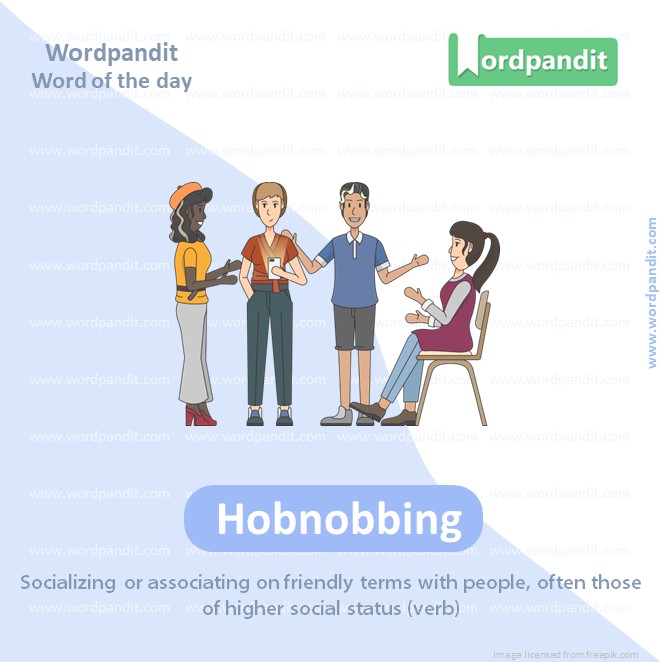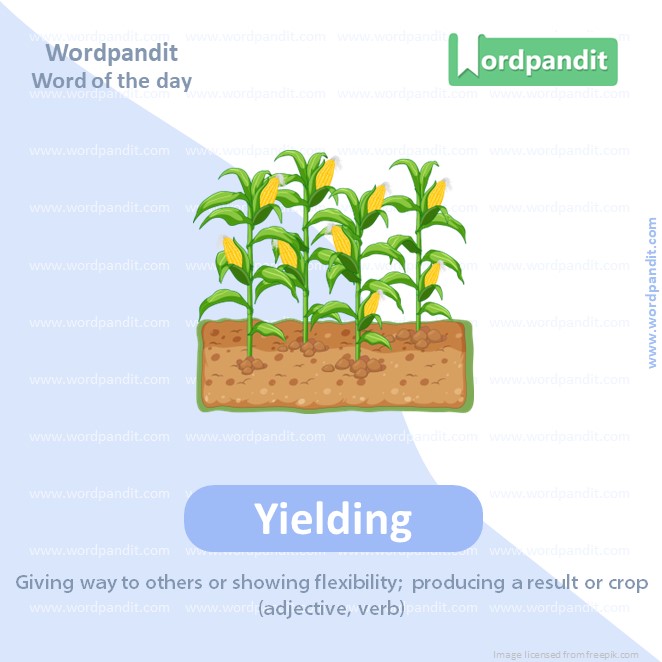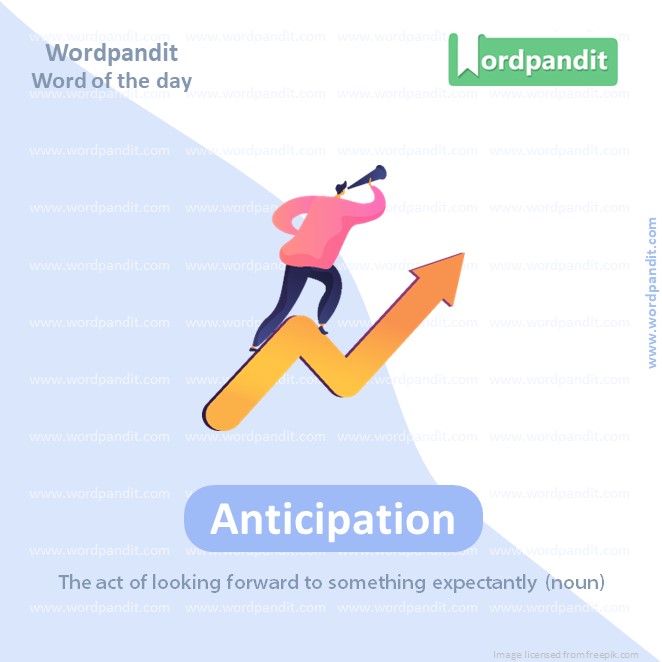Daily Vocabulary from Indian Newspapers and Publications
Welcome to Wordpandit’s Indian Vocabulary Hub
At Wordpandit, we understand the importance of staying rooted in the local context while expanding your language skills. This section focuses on enriching your vocabulary with words and phrases drawn from India’s leading newspapers and publications, ensuring you're learning vocabulary that is practical, relevant, and uniquely Indian.
Why Indian Sources Matter
We believe that the best way to master any language is by immersing yourself in local content. That’s why we carefully curate vocabulary from top Indian publications, including:
- The Hindu
- The Times of India
- The Economic Times
- Hindustan Times
- Live Mint
- The Indian Express
- And many others...
Stay Updated, Stay Relevant
With daily updates from Indian news sources, you’ll be consistently learning words that reflect the trends and shifts in Indian society and culture. Our focus is to provide vocabulary that enhances your understanding of the language in an Indian context.
How Wordpandit Supports Your Goals
Whether you’re preparing for exams, aiming to improve your professional communication, or simply want to stay connected with the latest Indian vocabulary, Wordpandit is here to guide you every step of the way.
Learn with a Practical Approach
Our interactive learning methodology includes real-world examples, engaging activities, and context-specific usage to ensure that every word becomes part of your active vocabulary.
Dive into Indian Vocabulary Today!
Why Choose Wordpandit?
Practical Learning: Focus on words you'll actually encounter in real-world reading, enhancing your comprehension and communication skills.
Diverse Content: From current affairs to scientific breakthroughs, our varied sources expose you to vocabulary across multiple domains.
Effortless Integration: Make Wordpandit a part of your daily routine. Just a few minutes each day can significantly boost your lexicon over time.
Your Path to Vocabulary Mastery
- Visit our Daily Vocabulary section regularly
- Explore new words and their usage in context
- Practice incorporating these words into your own writing and speech
- Track your progress as your vocabulary expands
Start Your Journey Today
Embark on your vocabulary enhancement journey with Wordpandit. By consistently engaging with our daily posts, you'll build a robust vocabulary that serves you well in academic, professional, and personal contexts.
Remember, a word a day keeps linguistic limitations at bay. Make Wordpandit your daily companion in the quest for vocabulary excellence!
WORD-1: Precipitated
Context:
"(BJP) precipitated a crisis for Kumar via Chirag Paswan in the run-up to 2020 assembly elections." - Indian Express
Explanatory Paragraph:
The word "precipitated" refers to causing something to happen suddenly or sooner than expected. In the given context, it means the BJP triggered or brought about a political crisis for Nitish Kumar, and did so quickly and perhaps unexpectedly, using Chirag Paswan’s political actions as a catalyst. The word is often used in political, scientific, or emotional contexts where a chain reaction is set off swiftly due to a particular action.
Meaning: To cause an event or situation to happen suddenly or prematurely (verb)
Pronunciation: pri-SIP-ih-tay-tid
Difficulty Level: ⭐⭐⭐ Intermediate
Etymology: From Latin *praecipitare*, meaning "to throw headlong," from *praeceps* meaning "headlong, steep"
Prashant Sir's Notes:
This word is often used in political or crisis-related scenarios. Remember, it doesn’t always have a negative connotation — it simply implies urgency or suddenness. It's very common in journalistic writing.
Synonyms & Antonyms:
Synonyms: Trigger, Cause, Accelerate, Instigate, Spark
Antonyms: Delay, Hinder, Prevent, Stall
Usage Examples:
- The announcement of his resignation precipitated unrest within the party.
- A minor disagreement between leaders precipitated a major political fallout.
- The rapid interest rate hikes precipitated a market crash.
- Her sudden departure from the company precipitated a leadership vacuum.
Cultural Reference:
"The assassination of Archduke Franz Ferdinand precipitated World War I." - Common historical reference
Think About It:
Can one small event truly precipitate large-scale change, or is it always part of a bigger build-up?
Quick Activity:
Write down 3 events from history or current affairs where one decision or action precipitated a larger outcome. Briefly explain each.
Memory Tip:
Think of “precipitated” as someone pushing a rock off a cliff — it happens quickly and leads to a cascade of events below.
Real-World Application:
In business, political analysis, and crisis communication, "precipitated" is used to describe causes behind rapid shifts — understanding its use helps in framing timely responses or narratives.
WORD-2: Hobnobbing
Context:
"There were rumours of his one-time lieutenant RCP Singh hobnobbing with the BJP." - Indian Express
Explanatory Paragraph:
"Hobnobbing" refers to mixing socially, especially with people considered important or influential. In the political context provided, it suggests that RCP Singh was seen socializing or getting close to BJP leaders, perhaps informally or behind the scenes. The word often carries a hint of informality or coziness in relationships that might raise eyebrows, especially in politics or business.
Meaning: To mix socially, especially with those of higher status (verb)
Pronunciation: HOB-nob-ing
Difficulty Level: ⭐⭐ Basic to Intermediate
Etymology: From early 18th-century usage of "hob and nob," meaning to drink together or toast; from the Middle English phrase "habbe nabbe" meaning “have or have not.”
Prashant Sir's Notes:
Hobnobbing implies informal social interaction — often seen as friendly networking or even secretive mingling. It can sometimes have a slightly negative or gossipy tone when used in political or elite contexts.
Synonyms & Antonyms:
Synonyms: Socialize, Schmooze, Associate, Mingle, Fraternize
Antonyms: Avoid, Shun, Isolate, Ignore
Usage Examples:
- He was seen hobnobbing with celebrities at the film premiere.
- The minister was accused of hobnobbing with business tycoons during the conference.
- Students were hobnobbing with alumni at the networking event.
- Rumors spread when the opposition leader was caught hobnobbing with ruling party members.
Cultural Reference:
"He's always hobnobbing with the rich and famous." – A line often used in celebrity gossip columns and media.
Think About It:
Is there a difference between strategic networking and hobnobbing — or is it all about perception?
Quick Activity:
Think of a professional or public figure. Write a short paragraph using "hobnobbing" to describe their recent social activity.
Memory Tip:
Imagine two people at a party clinking glasses and saying "hob-nob!" as they mingle — that's hobnobbing in action.
Real-World Application:
Understanding "hobnobbing" helps you interpret media narratives, especially when reading about alliances, elite circles, or informal power plays in politics and business.
WORD-3: Yielding
Context:
"The chances of this platform yielding electoral benefits to the Congress was slim, it had not stopped the party from campaigning on this issue in the recent round of assembly elections in Madhya Pradesh, Rajasthan, and Chhattisgarh." - Indian Express
Explanatory Paragraph:
In this context, "yielding" means producing or giving results. The sentence implies that although it was unlikely that the Congress party’s platform would bring electoral success, they still chose to campaign on it. "Yielding" is often used to describe what something produces — whether it’s results, crops, profits, or outcomes — and can apply to various domains like politics, business, agriculture, or science.
Meaning: Producing or providing (results, profits, outcomes, etc.) (verb - present participle)
Pronunciation: YEEL-ding
Difficulty Level: ⭐⭐ Basic to Intermediate
Etymology: From Old English *gieldan*, meaning "to pay, repay, give up, surrender"
Prashant Sir's Notes:
Yielding is a flexible word. In politics or economics, it usually refers to outcomes or returns. It can also mean giving in, but here, it’s about producing benefits. Always pay attention to the context!
Synonyms & Antonyms:
Synonyms: Producing, Generating, Delivering, Resulting in, Providing
Antonyms: Withholding, Failing, Resisting, Blocking
Usage Examples:
- The new strategy is yielding better results than expected.
- Despite efforts, the investment is not yielding any profit.
- The fertile land is capable of yielding high crop outputs.
- The policy change is slowly yielding positive social outcomes.
Cultural Reference:
"You reap what you sow" — a proverb often used to describe how actions yield corresponding outcomes, especially in politics and morality.
Think About It:
Is it worth pursuing a course of action if it yields little benefit in the short term but has long-term value?
Quick Activity:
Write two sentences using "yielding" — one in a political context and one in a personal or academic context.
Memory Tip:
Think of a tree "yielding" fruit — it's producing something useful. In any context, yielding means giving results.
Real-World Application:
"Yielding" is commonly used in investment reports, political analysis, and agricultural output discussions. Knowing how to use it can enhance your formal writing and analysis skills.
WORD-4: Enthusiastically
Context:
"Deepawali is one of the most enthusiastically celebrated festivals in the country." - Indian Express
Explanatory Paragraph:
"Enthusiastically" means doing something with intense excitement, eagerness, or active interest. In the given sentence, it reflects the joy and high energy with which people across India celebrate Deepawali — lighting lamps, bursting firecrackers, decorating homes, and sharing sweets. The word conveys strong positive emotion and a high level of involvement or passion in an activity.
Meaning: In a way that shows intense and eager enjoyment, interest, or approval (adverb)
Pronunciation: en-THOO-zee-AS-ti-kuh-lee
Difficulty Level: ⭐ Basic
Etymology: From Greek *enthousiasmos* meaning "divine inspiration" — from *enthousiazein* (to be inspired or possessed by a god)
Prashant Sir's Notes:
Always note the root word here — “enthusiasm.” Add “-ically” and you get the adverb. Use this word when someone is full of passion or very excited about doing something. It adds energy to your writing!
Synonyms & Antonyms:
Synonyms: Eagerly, Passionately, Zealously, Energetically, Excitedly
Antonyms: Reluctantly, Indifferently, Half-heartedly, Unwillingly
Usage Examples:
- She enthusiastically agreed to lead the school play.
- The crowd cheered enthusiastically for the winning team.
- He enthusiastically volunteered for every community event.
- Children enthusiastically participated in the Diwali decoration contest.
Cultural Reference:
During festivals like Holi, Ganesh Chaturthi, and Deepawali, Indian communities come together to celebrate enthusiastically with colors, lights, and devotion — showcasing cultural unity and joy.
Think About It:
What activities do you do enthusiastically, and why do they excite you more than others?
Quick Activity:
List 3 things you would describe yourself doing "enthusiastically." Write a sentence for each using the word.
Memory Tip:
Think of "enthusiastically" as doing something with your whole heart and a big smile — full of energy and excitement!
Real-World Application:
Use “enthusiastically” in speeches, motivational writing, cover letters, or event descriptions to convey positive energy and commitment.
WORD-5: Anticipation
Context:
"The journey was a rollercoaster of emotions, with moments of anticipation that the ordeal would soon end followed by disappointment as tactic after tactic failed, until eventually, the mountain relented." - Indian Express
Explanatory Paragraph:
"Anticipation" captures the emotional state of waiting for something—often something significant or exciting—to happen. In the context of a challenging journey, anticipation reflects the hope or expectation that relief or success is near. It can be both uplifting and nerve-wracking, depending on whether what is anticipated comes true or not.
Meaning: A feeling of excitement or anxiety about something that is going to happen (Noun)
Pronunciation: an-ti-suh-PAY-shun
Difficulty Level: :star::star: Moderate
Etymology: From Latin "anticipationem" meaning "preconception or foreseeing", derived from "anticipare" meaning "take care of ahead of time."
Prashant Sir's Notes:
Think of “anticipation” as the mental state of being on the edge of your seat. It's useful in emotional, narrative, and psychological contexts. It’s often about emotional build-up before a major event or outcome. It can be positive or negative depending on what’s expected.
Synonyms & Antonyms:
Synonyms: expectation, excitement, hope, eagerness, suspense
Antonyms: surprise, ignorance, indifference, apathy
Usage Examples:
- She waited in breathless anticipation as the announcer read the winner’s name.
- The team's anticipation of the final match was almost palpable.
- There was a quiet anticipation in the air before the big reveal.
- His anticipation turned into anxiety when the results were delayed.
Cultural Reference:
"Anticipation is making me wait." - From the famous Carly Simon song *Anticipation*, which explores the emotional highs of waiting for something meaningful to happen.
Think About It:
How does anticipation affect your actions and emotions—does it make you more hopeful, or more anxious?
Quick Activity:
Write two sentences: one showing positive anticipation (e.g., before a festival), and one showing negative anticipation (e.g., before an exam).
Memory Tip:
Think of a movie trailer—the thrill you feel before watching the full movie is *anticipation*. Trailer = Tension = Anticipation.
Real-World Application:
"Anticipation" is commonly used in marketing (e.g., product launches), storytelling (e.g., cliffhangers), and psychology (e.g., anticipation anxiety before public speaking). Understanding this word helps in both expressing and managing emotional expectations.



















